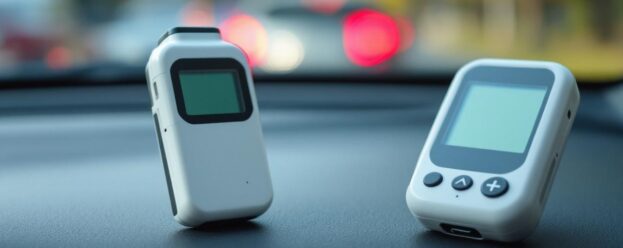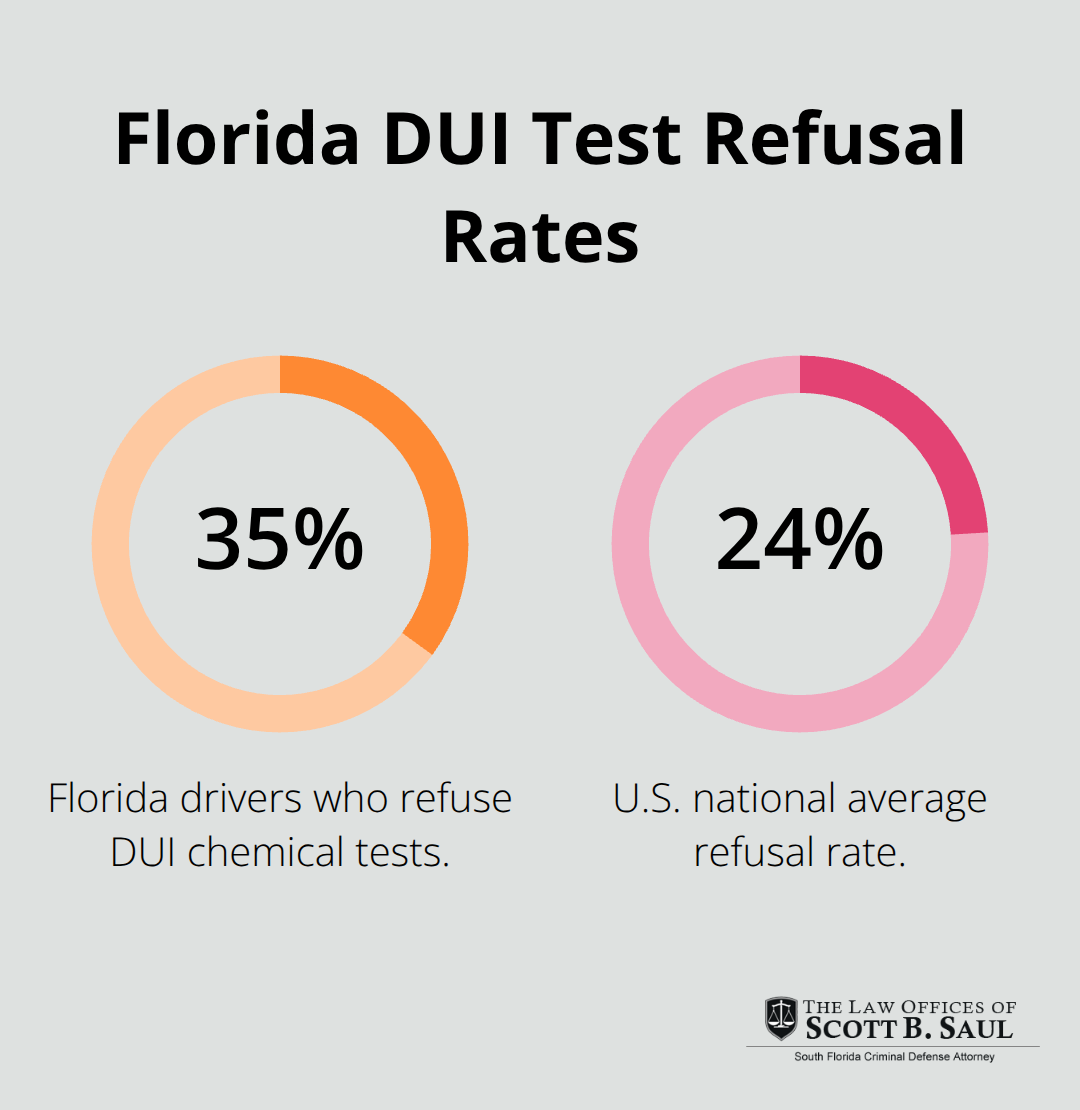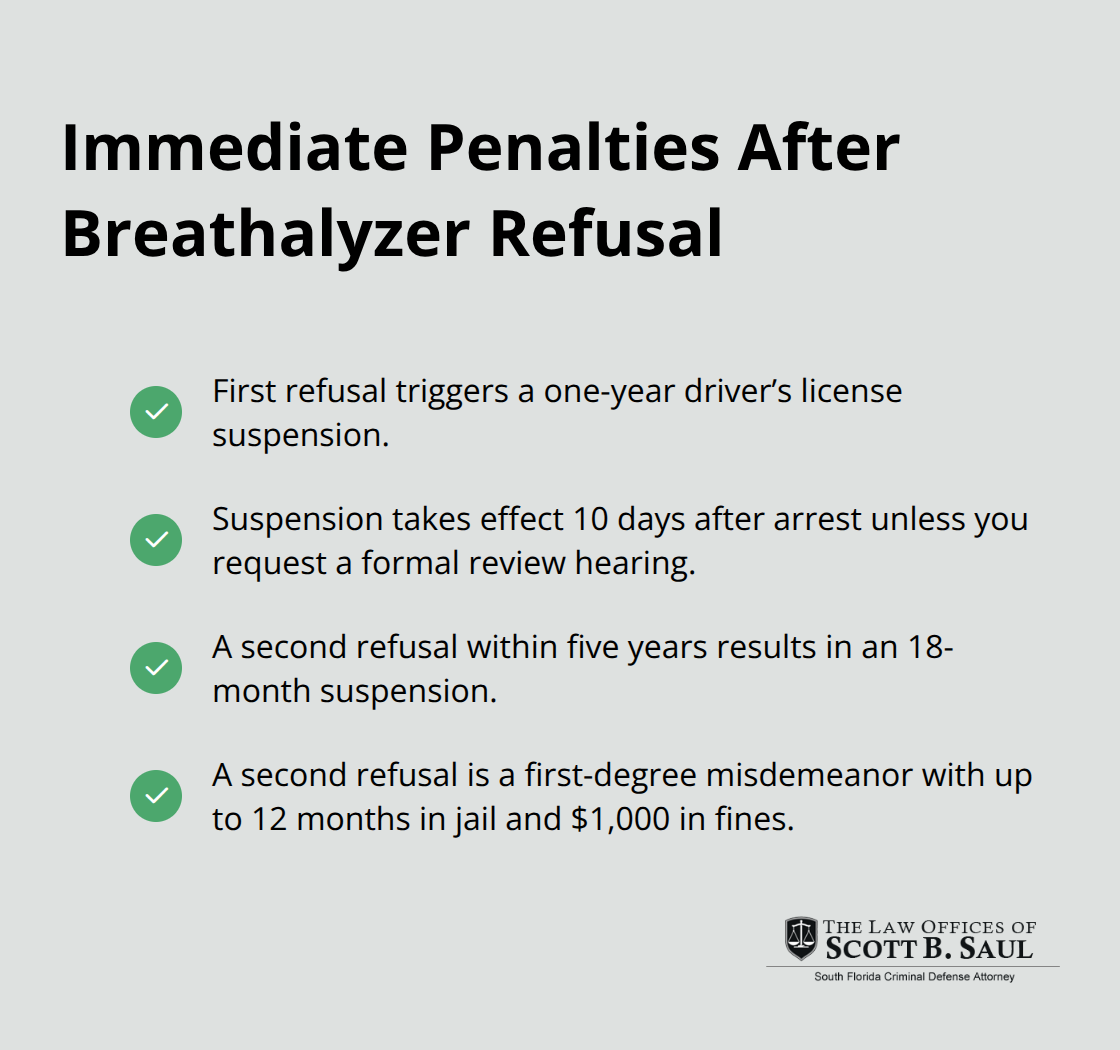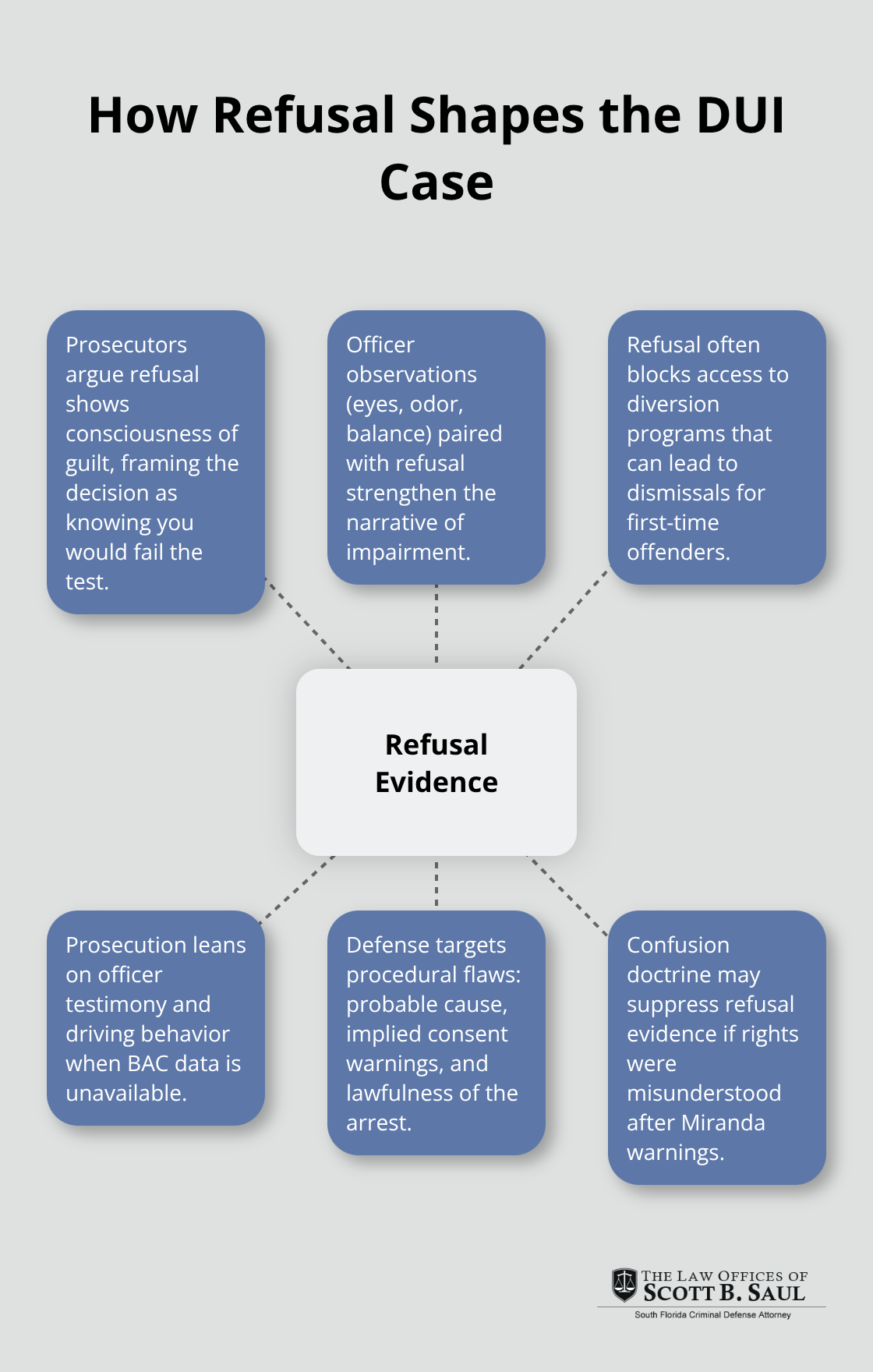Refusing a Breathalyzer in Florida What are the Consequences?
By : saulcrim | Category : Criminal Defense | Comments Off on Refusing a Breathalyzer in Florida What are the Consequences?
27th Nov 2025

When pulled over for suspected DUI in Florida, you face a split-second decision about taking a breathalyzer test. Refusing breathalyzer Florida drivers should know carries serious automatic penalties.
We at Law Offices of Scott B. Saul see clients struggle with this choice daily. The consequences extend far beyond your criminal case and can impact your driving privileges immediately.
Florida’s Implied Consent Law and Breathalyzer Refusal
Florida’s implied consent law operates on a simple principle: when you obtain a driver’s license, you automatically agree to submit to chemical tests if arrested for DUI. The Florida Department of Highway Safety and Motor Vehicles processed 15,199 refusals in 2022 alone, which shows how many drivers misunderstand this legal requirement. This consent applies specifically to breath, blood, or urine tests administered after a lawful arrest, not to field sobriety tests performed roadside.
Understanding Your Legal Obligations After Arrest
Officers can request field sobriety tests before arrest, but you have no legal obligation to perform these balance and coordination exercises. However, once arrested, you must comply with chemical tests or face immediate penalties under Florida Statutes Section 322.2615. The law requires officers to read you an implied consent warning that explains the consequences of refusal. If they fail to provide this warning properly, your refusal may become inadmissible in court. Approximately 35% of Florida drivers refuse DUI tests (compared to the national average of 24%), according to state highway safety data.

Field Sobriety Tests vs Chemical Testing Requirements
Field sobriety tests assess your physical coordination and mental alertness through standardized exercises like walking a straight line or standing on one leg. These tests are subjective and can be affected by medical conditions, uneven surfaces, or poor lighting conditions. Chemical tests measure your blood alcohol content through scientific instruments. While breathalyzer machines have documented accuracy issues with studies showing sensitivity of only 26% in some cases, you must still submit to these tests after arrest or face mandatory administrative penalties separate from any criminal charges.
The stakes become much higher once you refuse chemical tests, as Florida law now treats refusal as a criminal offense with immediate consequences that affect both your license and your case.
Immediate Consequences of Refusing a Breathalyzer Test
Refusal activates immediate administrative penalties that start within hours of your arrest. The Florida Department of Highway Safety and Motor Vehicles automatically suspends your license for one year on a first refusal, regardless of whether you face criminal charges. This administrative action operates independently from court proceedings and takes effect 10 days after your arrest unless you request a formal review hearing.

A second refusal within five years escalates to an 18-month suspension and becomes a first-degree misdemeanor with up to 12 months in jail and $1,000 in fines.
New Criminal Penalties for First-Time Refusals
Florida changed its approach in October 2025, making first-time breathalyzer refusal a second-degree misdemeanor rather than just an administrative violation. Courts must treat refusal as a full criminal conviction without the option to withhold adjudication of guilt. This criminal record affects employment opportunities, especially for professional drivers, security personnel, and healthcare workers who undergo background checks. The administrative and criminal penalties now run parallel, which doubles the consequences compared to previous years when refusal only resulted in license suspension.
Automatic Driver’s License Suspension Periods
License suspension immediately affects your ability to commute, earn income, and handle family responsibilities. Professional drivers face immediate job termination, while others may struggle with lengthy commutes via public transportation or ride-sharing services. The suspension period cannot be reduced through plea agreements or court orders (unlike some other traffic violations). First refusals result in mandatory one-year suspensions, while subsequent refusals within five years trigger 18-month suspensions that cannot be shortened regardless of circumstances.
Impact on Work and Daily Life
The financial impact extends beyond lost wages to include increased insurance premiums, legal fees, and transportation costs that can total thousands of dollars monthly during the suspension period. Hardship licenses become more difficult to obtain under the new laws, requiring proof of enrollment in DUI education programs and installation of ignition interlock devices even for refusal cases. These immediate consequences create a foundation for how prosecutors will approach your case, as refusal now provides them with both administrative violations and criminal charges to pursue in court.
How Breathalyzer Refusal Affects Your DUI Case
Prosecutors treat breathalyzer refusal as powerful evidence of consciousness of guilt. They argue that sober drivers would willingly take the test. Florida courts allow refusal evidence in criminal proceedings, where prosecutors present your decision as proof you knew you would fail the test.
This evidence becomes particularly damaging when combined with officer observations of bloodshot eyes, alcohol odor, or unsteady movement during the traffic stop. The prosecution’s case becomes stronger because they can argue both that you were intoxicated and that you knew it. This creates a double-edged sword that makes plea negotiations more difficult.

Refusal Blocks Access to Diversion Programs
First-time DUI offenders who take breathalyzer tests often qualify for pre-trial diversion programs that can lead to charge dismissals after they complete community service and DUI education courses. Refusal cases rarely receive these opportunities because prosecutors view non-compliance as unwillingness to accept responsibility.
Studies show that defendants who refuse tests face statistical disadvantages in court proceedings. This disadvantage means you lose leverage in plea negotiations and face harsher sentences from prosecutors who view refusal as an aggravating factor rather than a constitutional right.
Defense Strategies Target Procedural Violations
Successful refusal defenses attack the arrest process rather than test results since no BAC evidence exists. Defense attorneys examine whether officers had probable cause for the initial stop, followed proper implied consent warning procedures, and conducted the arrest lawfully.
The confusion doctrine provides another defense avenue when drivers genuinely misunderstood their rights after Miranda warnings (though this requires clear documentation of mental state at arrest). Officers must deliver implied consent warnings clearly and allow reasonable time for decision-making. This creates opportunities to suppress refusal evidence when procedures were rushed or unclear.
Prosecution Uses Refusal as Primary Evidence
Without breathalyzer results, prosecutors rely heavily on officer testimony about your behavior, appearance, and driving patterns. They present refusal as the centerpiece of their case, arguing it demonstrates guilty knowledge. This shifts the burden to your defense team to challenge every aspect of the stop and arrest.
The prosecution will emphasize that Florida’s implied consent law makes refusal itself a violation. They combine this with any physical evidence of impairment to build their case. Your refusal becomes both the crime they’re prosecuting and evidence of the underlying DUI charge.
Final Thoughts
Refusing a breathalyzer in Florida presents drivers with a complex decision that has no clear-cut answer. The test provides evidence against you, while refusal now carries criminal penalties and license suspension that begin immediately. The 2025 law changes eliminated many advantages of refusal by making it a criminal offense rather than just an administrative violation.
Your decision depends on specific circumstances that include prior DUI history, observed impairment signs, and arrest circumstances. First-time offenders who comply often access diversion programs that can lead to dismissed charges. Refusal blocks these opportunities while it provides prosecutors with consciousness of guilt evidence.
We at Law Offices of Scott B. Saul have defended numerous DUI charges and refusals in Florida courts. If you refused a breathalyzer test, act quickly to request a formal review hearing within 10 days to contest license suspension (you have limited time to protect your rights). Contact experienced criminal defense representation immediately to challenge procedural violations and build your defense strategy before evidence disappears or witnesses become unavailable.
Archives
- November 2025 (8)
- October 2025 (8)
- September 2025 (9)
- August 2025 (8)
- July 2025 (8)
- June 2025 (9)
- May 2025 (9)
- April 2025 (8)
- March 2025 (9)
- February 2025 (8)
- January 2025 (9)
- December 2024 (10)
- November 2024 (5)
- July 2024 (2)
- June 2024 (2)
- May 2024 (2)
- April 2024 (2)
- March 2024 (2)
- February 2024 (2)
- January 2024 (2)
- December 2023 (2)
- November 2023 (2)
- October 2023 (2)
- September 2023 (2)
- August 2023 (1)
- July 2023 (2)
- June 2023 (2)
- May 2023 (2)
- April 2023 (2)
- March 2023 (2)
- February 2023 (2)
- January 2023 (2)
- December 2022 (2)
- November 2022 (2)
- October 2022 (2)
- September 2022 (2)
- August 2022 (2)
- July 2022 (2)
- June 2022 (2)
- May 2022 (2)
- April 2022 (2)
- March 2022 (2)
- February 2022 (2)
- January 2022 (2)
- December 2021 (2)
- November 2021 (2)
- October 2021 (2)
- September 2021 (2)
- August 2021 (2)
- July 2021 (2)
- June 2021 (2)
- May 2021 (2)
- April 2021 (2)
- September 2020 (5)
- July 2020 (4)
- June 2020 (4)
- May 2020 (4)
- April 2020 (5)
- March 2020 (4)
- February 2020 (4)
- January 2020 (4)
- December 2019 (1)
- November 2019 (4)
- October 2019 (4)
- September 2019 (4)
- August 2019 (4)
- July 2019 (5)
- June 2019 (4)
- May 2019 (4)
- April 2019 (4)
- March 2019 (4)
- February 2019 (4)
- January 2019 (4)
- December 2018 (4)
- November 2018 (5)
- October 2018 (5)
- September 2018 (4)
- August 2018 (4)
- July 2018 (7)
- June 2018 (4)
- May 2018 (4)
- April 2018 (8)
- March 2018 (4)
- February 2018 (4)
- January 2018 (4)
- November 2017 (4)
- October 2017 (4)
- September 2017 (4)
- August 2017 (7)
- July 2017 (6)
- June 2017 (4)
- May 2017 (4)
- April 2017 (4)
- March 2017 (4)
- February 2017 (7)
- January 2017 (4)
- December 2016 (7)
- November 2016 (4)
- October 2016 (4)
- September 2016 (10)
- August 2016 (4)
- July 2016 (4)
- June 2016 (4)
- May 2016 (4)
- April 2016 (4)
- March 2016 (4)
- February 2016 (7)
- January 2016 (4)
- December 2015 (5)
- November 2015 (4)
- October 2015 (7)
- September 2015 (4)
- August 2015 (4)
- July 2015 (13)
- June 2015 (9)
- May 2015 (8)
- April 2015 (6)
- March 2015 (4)
- February 2015 (4)
- January 2015 (4)
- December 2014 (4)
- November 2014 (4)
- October 2014 (4)
- September 2014 (3)
Categories
- Adjudication (1)
- Bankruptcy (1)
- Burglary Crimes (3)
- calendar call (1)
- Car Accident (1)
- Criminal Defense (372)
- Cyber Crimes (7)
- DNA (1)
- Domestic Violence (9)
- Drug Crimes (5)
- DUI (12)
- Embezzlement (1)
- Environmental Crimes (4)
- Expungement Law (2)
- Federal Sentencing Law (3)
- Firearm (3)
- Forgery (4)
- General (82)
- Healthcare (3)
- Immigration (1)
- Indentity Theft (1)
- Insurance (5)
- judicial sounding (2)
- Juvenile Crimes (4)
- Manslaughter (4)
- Money Laundering (3)
- Organized Crime (1)
- Racketeering (1)
- Reckless Driving (3)
- RICO (3)
- Sealing and Expunging (2)
- Sex Offense (1)
- Shoplifting (1)
- Suspended Driver's License (1)
- Traffic (4)
- Trending Topics (1)
- White-collar Offenses (1)

